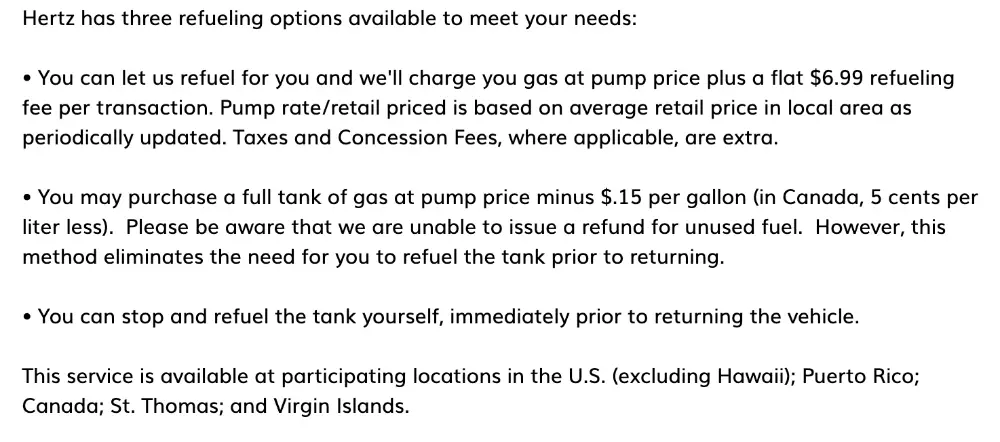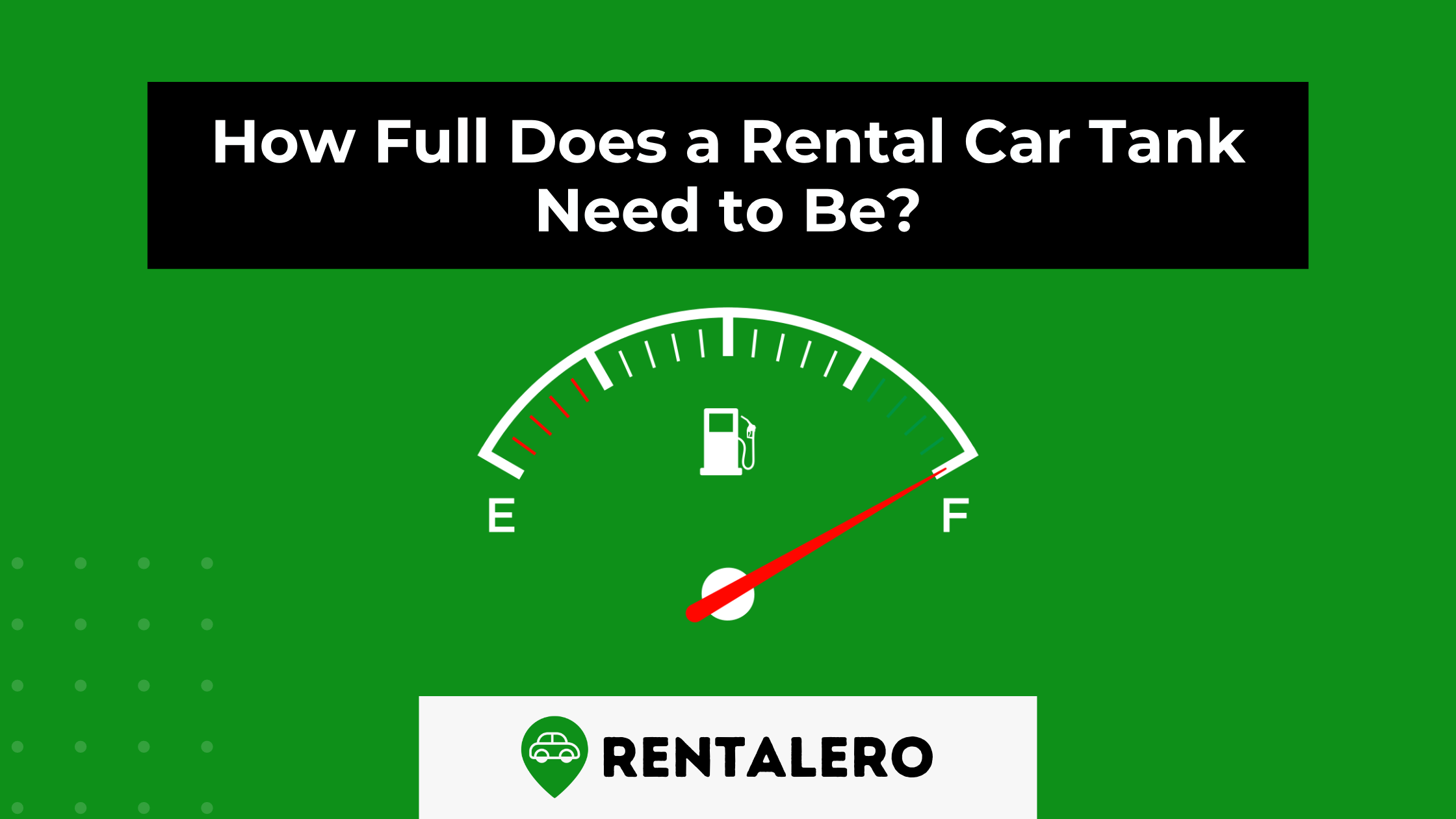A key aspect of car rental is being fully aware of the car rental’s fuel policy.
If you understand what the fuel policy of a rental company is, you can have a smooth and hassle-free experience.
Various car rental companies have different policies regarding fuel tank requirements upon return. Therefore, we will explore these policies and other options rental companies offer.
Let’s get into the nitty-gritty of car rental fuel policies.
Advertising links are marked with *. We receive a small commission on sales, nothing changes for you.
Key takeaways
- Different rental car companies have varying fuel policies
- Understanding what each procedure entails from a rental company.
- Rental companies primarily work with the best policies for them.
- Please fulfill a rental company’s policy to avoid additional charges.
- It is crucial to check the specific fuel policy of the rental car company you choose to avoid unexpected fees and ensure a smooth car rental experience.
The 3 Different types of car rental fuel policies
Rental companies use three significant fuel policies to decide how much a rental car tank needs.
These are:
1. As Rented or Like/Like Fuel Policy
The As Rented or Like/Like Fuel Policy is a standard fuel policy where you are required to return the rental car with the same fuel level as it had when you picked it up.
In other words, if the car had a full tank when you received it, you should return it with a full tank.
Similarly, if it had half a tank, you should refill it to half before returning it.
| Pros | Cons |
| Transparency: This policy ensures transparency as you are only responsible for maintaining the same fuel level. | Inconvenience: Managing the fuel level can be inconvenient, especially if you have a tight schedule or are unsure about the nearest gas station. |
| Cost Control: With this policy, you have control over the fuel expenses as you only need to refill the used fuel. | Time Constraints: Refilling the tank before returning the car may add extra time to your rental return process. |
Tips for Managing Fuel Levels:
- Plan Ahead: Keep track of your fuel usage during the rental period to estimate how much fuel you need to refill.
- Use Navigation Apps: Utilize navigation apps to locate nearby gas stations quickly.
- Refill in Advance: To avoid last-minute rushes, consider refilling the tank before returning the car.
2. Prepaid Fuel Option
When renting a car, some rental companies offer a prepaid fuel option.
This option allows you to purchase a full fuel tank from the rental company at a competitive price.
You pay upfront for the fuel you will use during your rental period.
| Pros | Cons |
| Convenience: Prepaid fuel option offers you comfort, and you don’t have to worry about finding a gas station before returning the car | Requires accurate estimation of your fuel needs before renting a car. If not, you might purchase more fuel than you will use. |
| Saves time and effort: With this policy, you have control over your time with no stress of finding a gas station. | Ineffective: if you plan on driving long distances or extensively during your rental period, the prepaid fuel option might be less cost-effective than refilling the tank. |
Before opting for the prepaid fuel option, consider the following factors.
- Assess your travel plans and estimate the fuel you will likely use.
- The prepaid option could be convenient if you anticipate minimal driving or short distances.
- If you plan extensive driving or are still determining the fuel consumption, refill the tank yourself.
3. Full Tank Policy
The whole tank policy is a standard fuel policy where renters must return the rental car with a full fuel tank, similar to the level it had when initially picked up.
This means that the car is provided to the renter with a full tank, and they are responsible for refilling it before returning the vehicle.
| Pros | Cons |
| Transparency: Clear expectation of returning the car with a full tank. | Time and Effort: Renters need to find a nearby gas station and refuel the car before returning, which can be inconvenient. |
| Avoid Additional Charges: Returning with a full tank helps avoid refueling fees. | Overestimation: Renters may refill more fuel than necessary, resulting in extra expenses. |
Tips for Returning a Car with a Full Tank
- Plan Ahead: Research nearby gas stations before your rental period ends.
- Monitor Fuel Gauge: Keep track of the fuel level to estimate when to refill.
- Refill in Advance: Top up the fuel slightly before returning to allow for any unexpected delays.
Checking the Fuel Policy
When renting a car, it is vital to familiarize yourself with the rental company’s fuel policy.
This ensures that you clearly understand the expectations and avoid any unexpected charges.
Knowing the fuel policy upfront allows you to plan your refueling strategy accordingly, saving time and money.
Three critical steps to find and understand the rental car fuel policy
1. Research: Visit the rental company’s website or contact their customer service to access their fuel policy information.
Here you can see it in the example of Hertz:

2. Read Carefully: Take the time to read and understand the policy thoroughly. Pay attention to the required fuel level upon return and any specific instructions or exceptions.
3. Clarify Ambiguities: Don’t hesitate to contact the rental company if you encounter any unclear or ambiguous points. It’s better to be well-informed than to assume incorrectly.
Conclusion
Throughout the article, we have discussed several fuel policies commonly found in car rental companies. And these include the as-rented policy, prepaid fuel options, and the full tank policy.
However, you must understand the specific fuel policy of the rental car company you choose to avoid unexpected charges.
Adhering to the policy ensures you have a smooth car rental experience.
Frequently Asked Questions
What is the “Rented” fuel policy?
The “As Rented” fuel policy requires returning the rental car with the same fuel level as when it was picked up.
What are prepaid fuel options?
Prepaid fuel options allow renters to purchase a full fuel tank from the rental company at a competitive price.
Do rental car companies require a full tank when returning the car?
Some rental car companies require the tank to be complete when returning the car.
What happens if I don’t return the rental car with a full tank?
Failure to return the rental car with a full tank may incur additional charges, such as fees or costs per mile driven without refueling.
Joy is an expert when it comes to peer-to-peer rentals and therefore deals predominantly with topics from this area at Rentalero. Her favorite platform: Turo.
Advertising links are marked with *. We receive a small commission on sales, nothing changes for you.

